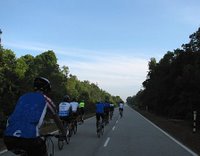For a short while - two weeks, to be exact - after i graduated from jc, i did relief teaching at a secondary school. I took over the duties of a teacher who was on extended sick leave, and taught English and Literature. Yesterday, i needed to find out exactly when i taught at the school, but it was nearly 5 years ago and i really couldn't recall. So i dug out some of the things that were associated with my short teaching stint: photographs taken with the students and a farewell card given by my (sec 2) form class. I was hoping there would be mention of dates somewhere, but alas, there was none. Then i dug out a letter written to me by the class monitor, a cheeky and mischievious boy who is quite a good talker. Reading the letter, i recalled how silly and embarrassed i was then, a junior college graduate who barely had what it takes to teach a group of young students like myself. I was there only because there was a job and it paid well - hardly a good reason for the education of young minds to be entrusted into my inexperienced hands, no matter how short the teaching stint lasted. I read the contents of the letter and was half-amused by the writing, half-horrified by experiences which it reminded me of.
"... ... just want to tell you that frm so many relief teacher that come across my class your are the most Patient and Serious teacher whom really worth earning the money. Serious manz, why are you so serious huh? I guess your dream of becoming a xxx xxx will be fufil! (sorry manz, my english was not tht gd) Frm what you teach us i learned alot manz. (Tone)!! Now wht tone am i using??
"... ... As a monitor, i take full Responsibility of any damage of your ear or throat... Cher, which relief teacher is the most pretty one huh?"
As i was reproducing these parts of his letter i almost burst out laughing. The monitor says in the letter he will 'take full responsibility of any damage of (my) ear or throat'. He needn't, but he correctly pointed out the dangers i was exposed to, for most of the time i was shouting and keeping the raucous class attentive rather than teaching. I had to thunder against the voices of more than thirty students - yes, thunder. I remember the class monitor very well. As evident from (the 'tone' of) his letter, he has an engaging personality, is playful and cheeky, but not in a disrespectful way. That he wrote what he did and gave the letter to me on my last day shows his sincerity and sense of responsibility he felt as the leader of the class. I was grateful and touched by his gesture.
Two weeks is a very short period of time and i genuinely felt sorry for the students who had to suffer constant disruption to their educational process. No matter how good relief teachers are, if there is frequent change in teachers owing to whatever circumstances, it is ultimately the students who suffer. This is because the students have to make adjustments and adapt to new teaching styles and learning environment each time there's a change in their educators. And this can affect substantially their learning mood and progress. Moreover, without a permanent teacher overseeing the learning process, the students' progress cannot be followed up and it would be difficult to draw up long term plans to assist them. The form class that i taught was, in Singapore's educational jargon, from the normal academic stream. And these are the students who greatly need more attention and a consistent teacher to engage them.
I recall with great embarrassment an exercise i did with the class. As i had assumed the responsibilities of their form teacher, in addition to teaching them English and Literature i had to also conduct a 'civics class' session (that takes place every week) whereby class meetings are held or where the students would be taught non-academic subjects such as social skills and the like. (i readily admit i can't remember the exact function of the lesson.) Thank goodness i only had to do it once, for i was in a poor position (owing to my lack of experience) to conduct the lesson properly. Neither was i given any proper instructions - for, it was assumed, i was there only temporarily. By and large it is true that the lesson is not indispensable or extremely important (to the students, it's a non-lesson, good); i was there first and foremost to stand in for their form teacher, someone who by seniority of age is far wiser to deliver the lesson and achieve its objectives, whatever they are.
And so i wondered what to do with the bunch of boisterious kids who, we all know, ain't the least bit interested in hearing a teacher preach. In the end, i spoke to them about my aspirations (i am guessing here, coz i can't otherwise explain how the monitor knew about what i had wanted to become, then). It seems way too cheesy even as i recall now, but i made them close their eyes after that, spoke to them and encouraged them to think about what they want to achieve in life. Thereafter i made them write down their thoughts, and assured them no one else would read them except I. It was an exercise to make them think about and articulate their aspirations, so that they might work towards realising them. It's meant to increase their confidence and imbue in them a sense of purpose in life.
I was - still am - embarrassed and felt silly because, really, how much older was i than they? It's not as if i had experience on my side and had achieved my dream - did i even believe in having aspirations and living one's dreams in the first place? Nevertheless, it was humbling reading what they wrote for that exercise. The papers were returned to them later; now i can't recall much of what was written. Of course, some of them didn't take the exercise seriously and wrote something only because it had to be submitted. But i do remember one of them, a Malay girl, wanted to become a hairdresser; she wanted to set up her own salon. Most of them also expressed their wish to do well enough for their N' level examinations so they could clear the 'O' levels eventually.
As a teacher, reading all this, one feels an immense sense of duty to help these students clear the academic hurdles. In part because i was a relief teacher and had the time, and in part because i was idealistic and perhaps not a little naive at my age then, i responded and wrote comments in all the papers. I could only wish that i have spurred one or two students, and that all of them went on to do well in their studies and pursue their dreams.
---------------------------------
As an ex-undergrad who was schooled in the humanities and social sciences, teaching is one career which many people have asked if i would consider: not because i look like someone who can teach, but because teaching is one of the most viable career options for arts students. Besides, the job pays well.
I am not being modest here, but i believe i lack the qualifications to teach. I am not looking at primary school level teaching, but at the secondary level. The question is whether i specialise in any particular subject taught at the secondary level to be able to teach. But more important, i know teaching is not my calling. It's a noble profession, and one who chooses the teaching path had better be in it for the right reasons. However good one is in a particular subject, i believe the primary role of a teacher does not lie in teaching a subject, but nurturing the potential and facilitating the wide-ranging education process that a student goes through in school. Teaching is a very arduous and challenging journey because to be able to teach, a teacher may have to invest a great amount of mental attention first to changing students' attitudes and disciplining them. For learning is not merely just passively imbibing technical knowledge; there are so many varied dimensions that affect whether a student would learn effectively and thereby develop his mental faculties.
During the two weeks of relief teaching i also taught a normal technical stream class. Some students, who are gangsters, would walk out of the classroom midway during lesson. Once, i entered the classroom only to witness a fight; as a result the lesson could not proceed and other students were thus affected; and i later had to submit an eye-witness report to the school because fighting was involved.
Yet that's the tough job facing a teacher: taking on non-teaching roles; genuinely desiring to help each and every student, no matter their background or how hopeless a situation may seem; and being convinced of the noble aims of the profession before being able to convince and educate students. It is also the reason why many of my friends want to go back to their alma-mater to teach, for they know that there they have bright students who are far easier to teach; they can focus on teaching a subject they truly love rather than having to devote more energy on non-teaching aspects.
Teaching is a rewarding job which requires - indeed it demands - immense patience and hard work. You have to like engaging people, be prepared and motivated to spend a great deal of time and effort not teaching a subject, but settling problems, moulding characters and helping those who need personal attention and help most. Whoever decides on teaching as a career has to ask himself or herself whether he or she is ready for the challenge and hard work. Not the attractive renumeration.

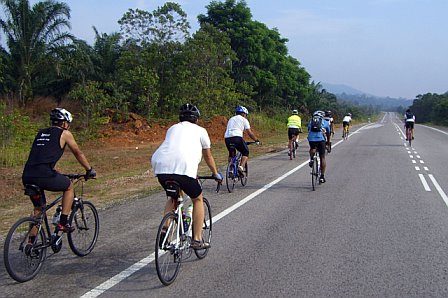 No buildings in sight. It was lovely - just us on the road, trees by the roadside, and a cloudy blue sky above. Taken on K's camera.
No buildings in sight. It was lovely - just us on the road, trees by the roadside, and a cloudy blue sky above. Taken on K's camera.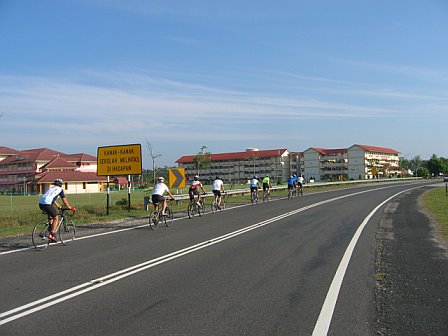 Riding past a school building, i think. The luscious space and the wide open roads were reassuring and inviting. Chin often cycled far ahead and stopped by the side to take photos of us cycling past, as he did for this one.
Riding past a school building, i think. The luscious space and the wide open roads were reassuring and inviting. Chin often cycled far ahead and stopped by the side to take photos of us cycling past, as he did for this one. A panoramic view of the landscape we often ride past. Courtesy of Chin.
A panoramic view of the landscape we often ride past. Courtesy of Chin.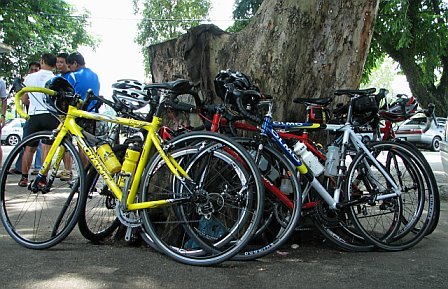 The roadies' bikes leaning against a tree by the eatery that we stopped at for lunch. I think, it was Eug and Ken who prompted me: 'You should take a photo of the bikes. Very nice.'
The roadies' bikes leaning against a tree by the eatery that we stopped at for lunch. I think, it was Eug and Ken who prompted me: 'You should take a photo of the bikes. Very nice.' I only knew this was taken when i looked through K's photographs for the trip. It was during our recce. i believe we stopped here to ascertain our rest-point for the ride. The road runs alongside the coast for this stretch.
I only knew this was taken when i looked through K's photographs for the trip. It was during our recce. i believe we stopped here to ascertain our rest-point for the ride. The road runs alongside the coast for this stretch.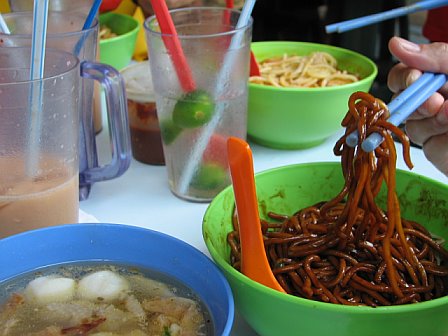 No ride is complete without makan. When the drinks came, i was like, 'So, this is lime juice. Luckily i didn't order it.' But the laksa was good. I ate all the (black) cockles in my laksa, while most of the others gave theirs to Daniel, who was only too happy to accept them.
No ride is complete without makan. When the drinks came, i was like, 'So, this is lime juice. Luckily i didn't order it.' But the laksa was good. I ate all the (black) cockles in my laksa, while most of the others gave theirs to Daniel, who was only too happy to accept them.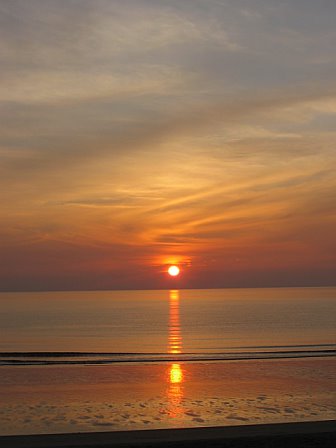 2nd day morning, around 7a.m. This is the east coast so we get the view of sunrise. Chin and a few others stopped their breakfast and ran out to the beach to snap photos when they saw the sun rising from the horizon. This is his. I didn't bring mine to breakfast, unfortunately. If not i can show them the power of 12x zoom!
2nd day morning, around 7a.m. This is the east coast so we get the view of sunrise. Chin and a few others stopped their breakfast and ran out to the beach to snap photos when they saw the sun rising from the horizon. This is his. I didn't bring mine to breakfast, unfortunately. If not i can show them the power of 12x zoom!